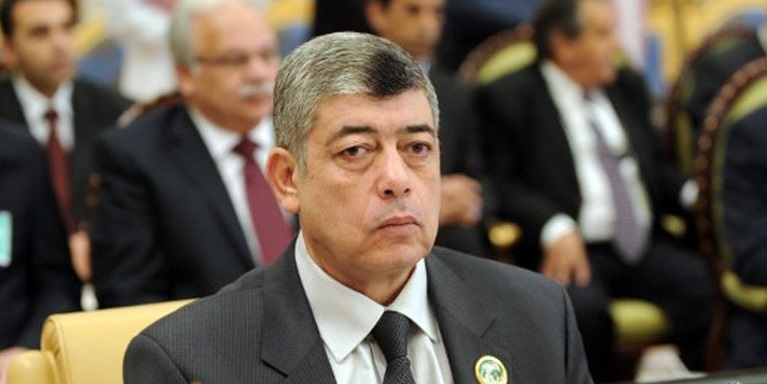
(AFP Photo)
Four Dutch citizens of Egyptian origin filed a case on Thursday to the Dutch general prosecution against Egyptian Minister of Interior Mohamed Ibrahim over crimes against humanity.
In a press conference lawyer in the case André Seebregts said that the four plaintiffs were present at “massacres” in Cairo in summer 2013, “where hundreds of unarmed protesters were killed by police and military”.
The protests concerned include the clashes at the Republican Guards Headquarters on 8 July, the Naser Road Clashes on 27 July, and the dispersal of the Rabaa Al-Adaweya sit-in on 14 August. According to a report by Human Rights Watch, the minimum death tolls for these incidents come in at 61, 95 and 817, respectively.
One of the plaintiffs was hit by a bullet in these clashes, Seebregts said. He expects to be able to gather enough evidence to prove crimes against humanity, citing the Human Rights Watch report, based on a large number of sources and eyewitness accounts, that also holds Ibrahim responsible for the killings.
He further said that they plan to file a suits against other Egyptian officials, including former president Adly Mansour and former prime minister Hazem El-Beblawi . The only reason for not including current President Abdel Fattah Al-Sisi, defence minister at the time of the incidents, is because Dutch law prohibits the filing of a case against an acting president, Seebregts added.
In a statement on Saturday, Seebregts explained that a conviction of Ibrahim for crimes against humanity would mean that the minister would not be able to travel to countries with which the Netherlands has an extradition treaty – including, among others, the United States, the European Union, Russia and Turkey – without risking to be arrested and referred to the Netherlands for prosecution.
Seebregts did not enclose the names or other information about the plaintiffs out of fear they could be arrested when travelling to Egypt. “At the moment, there appears to be no rule of law [in Egypt],” he said, referring to the mass death sentence of over 600 supporters of the ousted president Mohamed Morsi, without meeting the “most basic requirements for a fair trial” in Minya, Upper Egypt, in April.
On 8 September, Dutch journalist Rena Netjes filed a case in the Netherlands against the Egyptian journalist Sahar Ramzy over defamation. Netherlands-based Ramzy had written an article about Netjes, who is convicted in Egypt in absentia over charges of aiding terrorists and spreading false news in the case against the Al Jazeera journalists, accusing her of supporting terrorism and having extremist beliefs. Ramzy called on Egyptian authorities to take “appropriate measures against this shameless act that aims to tarnish Egypt”.
In another article in the Egyptian newspaper Al-Youm Al-Sabaa, the Netherlands-based Egyptian businessman Sameh Sourial had accused Netjes of telling “all lies” about Egypt and pledged to file a memo against her to the Dutch Ministry of Foreign Affairs.
Netjes said in a reaction that articles as these are ways to intimidate her to stop reporting on Egypt.



